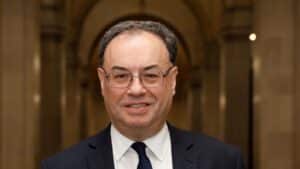
The governor of the Bank of England yesterday cast doubt on the need for further interest rate rises, sending the pound to a three-month low.
Andrew Bailey hinted that the Bank of England is through with lifting interest rates and stressed inflation was on course for a “marked” decline.
Responding to questions from MPs on the Treasury committee, Bailey insisted that interest rates were already in “restrictive” territory and that the central bank is “much nearer now to the top of the [tightening] cycle”.
Business briefing Morning and midday updates on financial and economic news from our award-winning business team. Sign up with one click
The monetary policy committee (MPC) has raised the base rate 14 times in a row to 5.25 per cent — the most aggressive tightening cycle since the 1980s — its highest level in 15 years.
Sterling tumbled shortly after Bailey’s comments, weakening about 0.6 per cent against the US dollar to below $1.25, a three-month low.
It is the latest sign that members of the nine-strong rate-setting MPC are concerned about heaping too much pressure on the UK economy at the expense of bringing inflation down.
The Bank governor’s comments echo those of the chief economist Huw Pill, who said last week he favoured keeping rates tighter for longer instead of sending them to a steep peak only to lower them shortly after. Ben Broadbent, a deputy governor at the Bank, said last month at the Jackson Hole economic symposium that he too favours a “higher for longer” approach.
Bailey said a sharp fall in inflation from a peak of 11.1 per cent in October last year to 6.8 per cent has diluted the need for more interest rate rises. When inflation was in the double digits, “it was clear that rates needed to rise going forward and the question was how much”, Bailey said at his first Treasury committee hearing since the end of the summer parliamentary recess, adding “we’re not in that place any more”.
There is concern that the Bank may tip the UK into an unnecessary recession by lifting borrowing costs too high. Purchasing managers’ indexes have fallen to their weakest level in nearly three years and official GDP estimates are already weak.
Since the 2008 financial crisis, more homeowners have taken out fixed-rate mortgages. That means it takes longer for the Bank of England’s interest rate changes to feed through to the economy.
Before Bailey’s comments financial markets expected the MPC to send rates up two more times this year to 5.75 per cent. Rate cuts were not priced in until the end of next year.
Read more:
Bank of England governor Andrew Bailey says Peak interest rates ‘reached’




